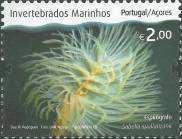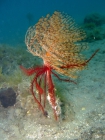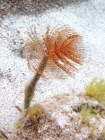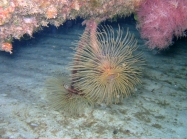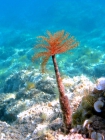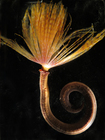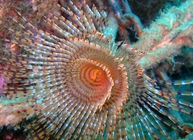RAS taxon details
Sabella spallanzanii (Gmelin, 1791)
130969 (urn:lsid:marinespecies.org:taxname:130969)
accepted
Species
Sabella penicillus (Linnaeus, 1758) · unaccepted (superseded recombination of...)
superseded recombination of subjective synonym
marine, brackish, fresh, terrestrial
recent only
(of ) Gmelin, J. F. (1791). Vermes. In: Gmelin J.F. (Ed.) Caroli a Linnaei Systema Naturae per Regna Tria Naturae, Ed. 13. Tome 1(6). G.E. Beer, Lipsiae [Leipzig]. pp. 3021-3910. <em>Systema Naturae. Linneaeus (ed.). Ed. 13.</em> 1: pars. 6., available online at http://www.biodiversitylibrary.org/item/83098#5
page(s): 3834 [details]
page(s): 3834 [details]
Read, G.; Fauchald, K. (Ed.) (2021). World Polychaeta database. Sabella spallanzanii (Gmelin, 1791). Accessed through: RAS (Eds.) (2021) Register of Antarctic Species at: http://ras.biodiversity.aq/aphia.php?p=taxdetails&id=130969 on 2025-09-12
RAS (Eds.) (2025). Register of Antarctic Species. Sabella spallanzanii (Gmelin, 1791). Accessed at: https://ras.biodiversity.aq/aphia.php/www.pfeil-verlag.de/04biol/www.pfeil-verlag.de/04biol/aphia.php?p=taxdetails&id=130969 on 2025-09-12
Date
action
by
original description
(of ) Gmelin, J. F. (1791). Vermes. In: Gmelin J.F. (Ed.) Caroli a Linnaei Systema Naturae per Regna Tria Naturae, Ed. 13. Tome 1(6). G.E. Beer, Lipsiae [Leipzig]. pp. 3021-3910. <em>Systema Naturae. Linneaeus (ed.). Ed. 13.</em> 1: pars. 6., available online at http://www.biodiversitylibrary.org/item/83098#5
page(s): 3834 [details]
additional source Biosis; Index To Organism Names, available online at http://www.biosis.org.uk/ion/results.asp [details]
additional source Bellan, G. (2001). Polychaeta, <i>in</i>: Costello, M.J. <i>et al.</i> (Ed.) (2001). European register of marine species: a check-list of the marine species in Europe and a bibliography of guides to their identification. <em>Collection Patrimoines Naturels.</em> 50: 214-231. (look up in IMIS) [details]
additional source Fattorini, Daniele and Regoli, Francesco 2006. Arsenic speciation in tissues of the Mediterranean Polychaete Sabella spallanzanii. Environmental Toxicology and Chemistry, 23(8):1881-1887 [details]
additional source Wilson, R.S.; Hutchings, P.A. and Glasby, C.J. (eds) 2003. List of Polychaete species introduced to Australia. Polychaetes: An Interactive Identification Guide. CSIRO Publishing, Melbourne [details]
additional source Brine, O.; Hunt, L.; Costello, M. J. (2013). Marine biofouling on recreational boats on swing moorings and berths. <em>Management of Biological Invasions.</em> 4(4): 327-341., available online at https://doi.org/10.3391/mbi.2013.4.4.07 [details] Available for editors
redescription Knight-Jones, Phyllis; Perkins, Thomas H. (1998). A revision of Sabella, Bispira and Stylomma (Polychaeta: Sabellidae). <em>Zoological Journal of the Linnean Society, London.</em> 123: 385-467., available online at https://doi.org/10.1111/j.1096-3642.1998.tb01370.x
note: includes analysis of the status of competing names [details] Available for editors
ecology source Read, G. B.; Inglis, G.; Stratford, P.; Ahyong, S. T. (2011). Arrival of the alien fanworm Sabella spallanzanii (Gmelin, 1791) (Polychaeta: Sabellidae) in two New Zealand harbours. <em>Aquatic Invasions.</em> 6(3): 273-279., available online at http://www.aquaticinvasions.net/2011/AI_2011_6_3_Read_etal.pdf [details]
page(s): 3834 [details]
additional source Biosis; Index To Organism Names, available online at http://www.biosis.org.uk/ion/results.asp [details]
additional source Bellan, G. (2001). Polychaeta, <i>in</i>: Costello, M.J. <i>et al.</i> (Ed.) (2001). European register of marine species: a check-list of the marine species in Europe and a bibliography of guides to their identification. <em>Collection Patrimoines Naturels.</em> 50: 214-231. (look up in IMIS) [details]
additional source Fattorini, Daniele and Regoli, Francesco 2006. Arsenic speciation in tissues of the Mediterranean Polychaete Sabella spallanzanii. Environmental Toxicology and Chemistry, 23(8):1881-1887 [details]
additional source Wilson, R.S.; Hutchings, P.A. and Glasby, C.J. (eds) 2003. List of Polychaete species introduced to Australia. Polychaetes: An Interactive Identification Guide. CSIRO Publishing, Melbourne [details]
additional source Brine, O.; Hunt, L.; Costello, M. J. (2013). Marine biofouling on recreational boats on swing moorings and berths. <em>Management of Biological Invasions.</em> 4(4): 327-341., available online at https://doi.org/10.3391/mbi.2013.4.4.07 [details] Available for editors
redescription Knight-Jones, Phyllis; Perkins, Thomas H. (1998). A revision of Sabella, Bispira and Stylomma (Polychaeta: Sabellidae). <em>Zoological Journal of the Linnean Society, London.</em> 123: 385-467., available online at https://doi.org/10.1111/j.1096-3642.1998.tb01370.x
note: includes analysis of the status of competing names [details] Available for editors
ecology source Read, G. B.; Inglis, G.; Stratford, P.; Ahyong, S. T. (2011). Arrival of the alien fanworm Sabella spallanzanii (Gmelin, 1791) (Polychaeta: Sabellidae) in two New Zealand harbours. <em>Aquatic Invasions.</em> 6(3): 273-279., available online at http://www.aquaticinvasions.net/2011/AI_2011_6_3_Read_etal.pdf [details]
 Present
Present  Inaccurate
Inaccurate  Introduced: alien
Introduced: alien  Containing type locality
Containing type locality
To Barcode of Life (70 barcodes)
To Biodiversity Heritage Library (7 publications)
To Biodiversity Heritage Library (93 publications) (from synonym Sabella penicillus (Linnaeus, 1758))
To European Nucleotide Archive, ENA (Sabella spallanzanii)
To GenBank (91 nucleotides; 128 proteins) (from synonym Sabella penicillus (Linnaeus, 1758))
To GenBank (91 nucleotides; 128 proteins)
To Global Invasive Species Database (GISD)
To Information system on Aquatic Non-Indigenous and Cryptogenic Species (AquaNIS)
To PESI
To PESI (from synonym Sabella penicillus (Linnaeus, 1758))
To USNM Invertebrate Zoology Annelida Collection (1 record) (from synonym Sabella penicillus (Linnaeus, 1758))
To USNM Invertebrate Zoology Annelida Collection (8 records)
To ITIS
To Biodiversity Heritage Library (7 publications)
To Biodiversity Heritage Library (93 publications) (from synonym Sabella penicillus (Linnaeus, 1758))
To European Nucleotide Archive, ENA (Sabella spallanzanii)
To GenBank (91 nucleotides; 128 proteins) (from synonym Sabella penicillus (Linnaeus, 1758))
To GenBank (91 nucleotides; 128 proteins)
To Global Invasive Species Database (GISD)
To Information system on Aquatic Non-Indigenous and Cryptogenic Species (AquaNIS)
To PESI
To PESI (from synonym Sabella penicillus (Linnaeus, 1758))
To USNM Invertebrate Zoology Annelida Collection (1 record) (from synonym Sabella penicillus (Linnaeus, 1758))
To USNM Invertebrate Zoology Annelida Collection (8 records)
To ITIS
